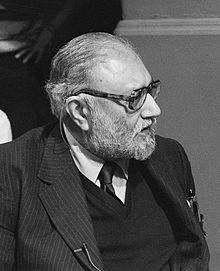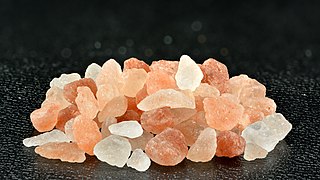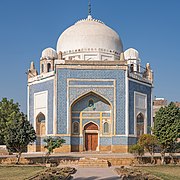Our website is made possible by displaying online advertisements to our visitors.
Please consider supporting us by disabling your ad blocker.
Portal:Pakistan

Introduction
 |
 |
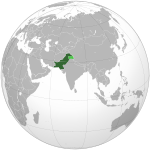
| |
Pakistan, officially the Islamic Republic of Pakistan, is a country in South Asia. It is the fifth-most populous country, with a population of over 241.5 million, having the second-largest Muslim population as of 2023. Islamabad is the nation's capital, while Karachi is its largest city and financial centre. Pakistan is the 33rd-largest country by area. Bounded by the Arabian Sea on the south, the Gulf of Oman on the southwest, and the Sir Creek on the southeast, it shares land borders with India to the east; Afghanistan to the west; Iran to the southwest; and China to the northeast. It shares a maritime border with Oman in the Gulf of Oman, and is separated from Tajikistan in the northwest by Afghanistan's narrow Wakhan Corridor.
Pakistan is the site of several ancient cultures, including the 8,500-year-old Neolithic site of Mehrgarh in Balochistan, the Indus Valley Civilisation of the Bronze Age, and the ancient Gandhara civilisation. The regions that compose the modern state of Pakistan were the realm of multiple empires and dynasties, including the Gandhāra, the Achaemenid, the Maurya, the Kushan, the Parthian, the Paratarajas, the Gupta; the Umayyad Caliphate in its southern regions, the Hindu Shahis, the Ghaznavids, the Delhi Sultanate, the Samma, the Shah Miris, the Mughals, the Durranis, the Sikhs and most recently, the British Raj from 1858 to 1947. (Full article...)
Selected article -

The prime minister of Pakistan (Urdu: وزير اعظم, romanized: Wazīr ē Aʿẓam, lit. 'Grand Vizier', Urdu pronunciation: [ʋəˈziːɾˌeː ˈɑː.zəm]) is the popularly elected politician who is the chief executive of the Government of Pakistan. The prime minister is vested with the responsibility of running the administration through his appointed federal cabinet, formulating national and foreign policies to ensure the safeguard of the interests of the nation and its people through the Council of Common Interests as well as making the decision to call nationwide general elections for the bicameral Parliament of Pakistan.
Since 1947, Pakistan has had 20 prime ministers, aside from the appointed caretaker prime ministers who were only mandated to oversee the system until the election process was finished. In Pakistan's parliamentary system, the prime minister is sworn in by the president and usually is the chairman or the president of the party or coalition that has a majority in the National Assembly– the lower house of Pakistan Parliament. (Full article...)
Selected picture -

| |
|
Jehangir's Tomb at Shahdara near Lahore. It is the mausoleum built for the Mughal Emperor Jahangir who ruled from 1605 to 1627. The mausoleum is located near the town of Shahdara Bagh in Lahore, Pakistan. His son Shah Jahan built the mausoleum 10 years after his father's death. It is sited in an attractive walled garden. Photo credit: Waqas Usman | |
General images
This week in history
- 8 October 2005: The Kashmir earthquake (also known as the South Asia earthquake or the Great Pakistan earthquake) of 2005, was a major earthquake, of which the epicentre was the Pakistan-administered Kashmir. The earthquake occurred at 08:50:38 Pakistan Standard Time (03:50:38 UTC) on 8 October 2005. It registered 7.6 on the richter scale making it a major earthquake similar in intensity to the 1935 Quetta earthquake, the 2001 Gujarat earthquake, and the 1906 San Francisco earthquake. The Pakistani government's official death toll was 73,276, while officials say nearly 1,400 people died in Jammu and Kashmir and fourteen people in Afghanistan. Most of the affected people lived in mountainous regions with access impeded by landslides that blocked the roads, leaving an estimated 3.3 million homeless in Pakistan.
Provinces and Territories
Clickable map of the four provinces and three federal territories of Pakistan.
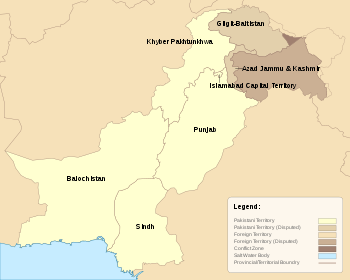 | |
|
Provinces: Territories: Pakistani-administered portions of the Kashmir: | |
Things you can do
Selected biography -
Mohammad Abdus Salam (/sæˈlæm/; pronounced [əbd̪ʊs səlaːm]; 29 January 1926 – 21 November 1996) was a Pakistani theoretical physicist. He shared the 1979 Nobel Prize in Physics with Sheldon Glashow and Steven Weinberg for his contribution to the electroweak unification theory. He was the first Pakistani and the first scientist from an Islamic country to receive a Nobel Prize and the second from an Islamic country to receive any Nobel Prize, after Anwar Sadat of Egypt.
Salam was scientific advisor to the Ministry of Science and Technology in Pakistan from 1960 to 1974, a position from which he played a major and influential role in the development of the country's science infrastructure. Salam contributed to numerous developments in theoretical and particle physics in Pakistan. He was the founding director of the Space and Upper Atmosphere Research Commission (SUPARCO), and responsible for the establishment of the Theoretical Physics Group (TPG). For this, he is viewed as the "scientific father" of this program. In 1974, Abdus Salam departed from his country in protest after the Parliament of Pakistan unanimously passed a parliamentary bill declaring members of the Ahmadiyya Muslim community, to which Salam belonged, non-Muslim. In 1998, following the country's Chagai-I nuclear tests, the Government of Pakistan issued a commemorative stamp, as a part of "Scientists of Pakistan", to honour the services of Salam. (Full article...)
Did you know?
- ... that Rehri Goth, one of the poor neighbourhoods on the outskirts of Karachi, is one of the oldest settlements dating back to the 13th century? (31 March 2024)
- ... that Burushaski, a predominantly in northern Gilgit-Baltistan spoken rather than written language, has not more than 120,000 native speakers? (9 July 2023)
- ... that the MagnifiScience Centre in Karachi is the only science center in the country, and, unlike a museum, visitors are encouraged to touch and learn from the interaction with the exhibits? (11 June 2023)
- ... that Ruth Katherina Martha Pfau, the famous German–Pakistani Catholic nun who devoted more than 55 years of her life to fighting leprosy was the first Christian and first non-Muslim to have a state funeral in Pakistan? (2 September 2021)
- ... that Lahore Metrobus open in 2013, was modelled after the Istanbul Bus Rapid Transit System. Plans were developed in the last quarter of 2011 by both local and Turkish experts.[1] (31 August 2021)
- ... that Lahore Knowledge Park is an actualization of Triple Helix configuration; a framework to create synergies between government, academia and industry to operate into an interactive rather than linear model for the establishment of social formats and entities to promote commercial innovation and R&D. [2] (27 January 2017)
- ... that Karachi Kings is the most expensive franchise team of Pakistan Super League? (04 December 2015)
- ... that Sialkot is the world's largest producer of hand-sewed footballs, with local factories manufacturing 40~60 million footballs a year, amounting to roughly 60% of world production. (4 December 2017)
- ... that Hafiz Muhammad Fazal Azim Taha, the famous living Pakistani poet said about Iqbal's work that "He not only dreamed for Pakistan but also got the nation up for their rights". This famous saying is regarded as Iqbal's definition. (14 July 2014)
- ... that Tajammul Hussain Malik headed an unsuccessful coup attempt against Pakistani dictator General Zia-ul-Haq in 1980? (22 September 2009)
- ... that the Legal Framework Order, 1970, issued by Gen. Yahya Khan, set the rules for the first direct popular elections in the history of Pakistan? (14 September 2009)
- ... that in 1881 in the village of Bakhshali in northern Pakistan, the Bakhshali manuscript, the oldest surviving example of Indian mathematics, was discovered written on birch bark? (1 September 2008)
- ... that the original images of Lord Swaminarayan at the Shri Swaminarayan Temple in Karachi, Pakistan were removed and taken to India during the turbulent times of its partition? (1 September 2008)
- ... that Saudi Arabia promised to supply 50,000 barrels of free oil per day to help Pakistan if economic sanctions were imposed after its 1998 nuclear tests? (1 September 2008)
- ... that in a major improvement in bilateral relations in 2008, Pakistan proposed sharing nuclear technology with Bangladesh? (31 August 2008)
- ... that Abdur Rashid Kardar, a pioneer of the Pakistani film industry in Lahore, was a calligraphist who prepared posters for foreign-made films? (11 July 2008)
- ... that the Nigar Awards are the oldest awards of merit in the Pakistani film industry? (10 July 2008)
- ... that Syed Wajid Ali was the longest serving President of the Pakistan Olympic Association with a tenure of 26 years? (7 July 2008)
- ... that the 1948 film Teri Yaad was the first feature film to be released in Pakistan after the partition of India? (6 July 2008)
- ... that The Edhi Foundation, founded by Edhi, runs the world's largest volunteer ambulance service operating 1,800 of them with upto 6,000 a day in Karachi alone. (4 December 2017)
Pakistan news

- 10 January 2025 –
- Three of the twelve miners that were reported missing yesterday in an explosion at a coal mine in Singidi, Balochistan, Pakistan, are found dead by rescue workers. (CTV News)
- 9 January 2025 –
- Twelve miners are trapped in a collapsed coal mine in Balochistan, Pakistan, following a methane gas explosion. (AP)
- 7 January 2025 – Insurgency in Khyber Pakhtunkhwa
- Three Pakistani soldiers and 19 Taliban insurgents are killed in shootouts in Khyber Pakhtunkhwa, Pakistan. (AP)
- 4 January 2025 – Insurgency in Balochistan
- One person is killed and 35 others are injured, including soldiers, in a car bombing in Turbat, Balochistan, Pakistan. The Balochistan Liberation Army claims responsibility for the attack, which states it targeted a military convoy. (AP)
- 30 December 2024 –
- In Pakistan, ten people are killed and seven are injured in a bus crash on a highway in Fateh Jang, Punjab. Separately, eight people are killed during a van–truck collision in Naushahro Feroze, Sindh. (AP)
- 28 December 2024 – 2024 Afghanistan–Pakistan skirmishes
- Afghanistan's Ministry of Defense announces that they targeted several locations in Pakistan in retaliation for Pakistani aircraft conducting aerial bombardments within Afghanistan. (Al Jazeera)
Quote of the Day -
| “ | There is no power on Earth that can undo Pakistan. | ” |
| — Muhammad Ali Jinnah (Founder of Pakistan) | ||
Subcategories
Pakistan topics
Recognized content
Related portals
Religions in Pakistan
Indian Subcontinent
Other countries
WikiProjects
 |
You are cordially invited to join and contribute to WikiProject Pakistan, a WikiProject dedicated to the development and improvement of articles relating to Pakistan.
|
Associated Wikimedia
The following Wikimedia Foundation sister projects provide more on this subject:
-
Commons
Free media repository -
Wikibooks
Free textbooks and manuals -
Wikidata
Free knowledge base -
Wikinews
Free-content news -
Wikiquote
Collection of quotations -
Wikisource
Free-content library -
Wikiversity
Free learning tools -
Wikivoyage
Free travel guide -
Wiktionary
Dictionary and thesaurus
Wikipedias in Pakistani languages
Sources
- ^ Mahendra, Anjali. "The Metro Bus System comes to Lahore, Pakistan". TheCityFix. World Resources Institute. Retrieved 31 August 2021.
- ^ "Lahore Knowledge Park Company".
Previous Page Next Page




















